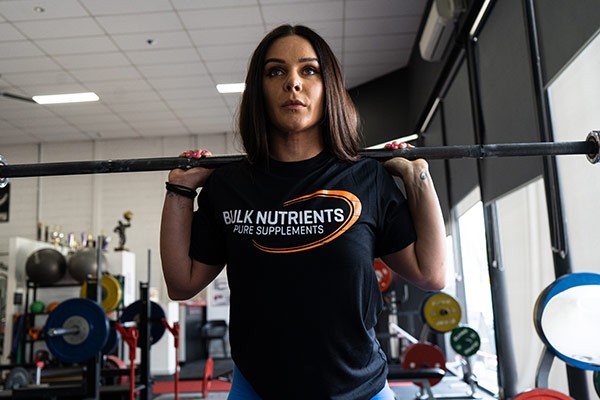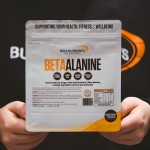Why You Should Supplement With Beta Alanine

Supercharge your performance with Beta Alanine
If you’ve ever bought a pre workout you’ve likely seen beta alanine in the ingredients list, or for those pre workout lovers you might have heard of its benefit when taken before training. No matter your knowledge of beta alanine, by the end of this blog you’ll be an expert and will take home some very useful tips.
If you’ve tried beta alanine in the past you can no doubt vouch for the face “tingles” (known as paraesthesia), which can only be described to a non-user as tiny spiders crawling over your skin.
However, the utility of beta alanine – and the research in support of this supplement – is extensive. For us to obtain the full performance advantages of beta alanine we must understand how it works, who it’s best for, and how we should take it.
What is Beta Alanine?
To provide context for the deeper discussion of beta alanine, I’d like to provide a quick introduction to this awesome supplement.
Beta alanine is a modified version of the amino acid alanine and is used as a performance aid mainly because of its implications with increased muscle endurance. It’s a Group A supplement as classed by the Australian Institute of Sport (AIS), meaning performance-enhancing benefits of beta alanine HAVE been supported by controlled scientific studies, and that competitive athlete are permitted to use it.
If you are unsure whether the claims of any supplement are supported by evidence, or if the supplement is safe, I encourage you to consult the AIS position stand. If the supplement is not listed by the AIS, likely, it has not been shown to be safe and/or effective!
To summarise the previous research on beta alanine in a couple of sentences, supplementing daily for 4-8 weeks has been linked with improved performance in exercise efforts lasting 1-6 minutes. Researchers have also reported subjects being able to perform one or two additional reps in the gym when training in a range of 8-20 reps, closer to the endurance end of the repetition spectrum.

How does Beta Alanine work?
To understand why beta alanine is suited for exercise efforts of that duration we must first discuss how exactly beta alanine works when it’s taken (bear with me, it’s about to get sciencey!).
Beta Alanine is converted to carnosine in the body
When beta alanine is ingested it’s converted into carnosine inside the muscle by joining it to another amino acid, histidine. So despite beta alanine being considered a performance aid, the benefits acquired are actually via the effects of increased muscle carnosine concentrations, and not beta alanine per se.
If we didn’t supplement with beta alanine we would still have carnosine in our muscle, as carnosine’s function is to maintain the acid-base equilibrium (or pH) by buffering hydrogen ions. Carnosine is actually released from the muscle cell to perform its buffering action once a drop in pH is sensed due to an increase in hydrogen ions.
An increase in hydrogen ions occurs during high-intensity exercise and is actually the reason we get that burning sensation in our muscles during hard training (not a build-up of lactic acid like many belief). As exercise causes a build-up of hydrogen ions which makes us fatigue and impairs our performance, and carnosine – to say it simply – removes some of these hydrogen ions, we can begin to appreciate why increasing the concentrations of muscle carnosine could be helpful to our performance.
Boosting muscle carnosine can help delay fatigue
Interestingly, we see higher concentrations of carnosine in type 2 muscle fibres which experience the highest levels of hydrogen ion accumulation (meaning they fatigue quickly). A study also showed that when isolating a muscle sample and removing the carnosine, you observe an increase in acidity (meaning the pH is dropping via the build-up of hydrogen ions). Since muscle acidosis likely contributes to the onset of fatigue during high-intensity exercise, increasing muscle carnosine by supplementing beta alanine should theoretically improve buffering capacity and therefore delay the onset of fatigue, and allow us to train harder, for longer.
Other positive benefits of beta alanine supplementation
While the buffering action of increased muscle carnosine – after supplementing beta alanine – is likely to explain a significant portion of the performance advantages, it’s possible that beta alanine could further enhance performance via other mechanisms.
Understanding these other potential mechanisms associated with elevated carnosine stores may help to explain the performance improvements achieved by supplementing with beta alanine. High carnosine levels cause an increase in sensitivity of calcium release channels which could improve the force of muscle contractions, particularly when under fatigue.
Carnosine also has antioxidant properties, so it may reduce free radicals produced during exercise, with high levels of free radicals being associated with fatigue. Vasodilation (meaning an increase in diameter of blood vessels) is also an observed response to increased muscle carnosine content. Vasodilation has been suggested to improve performance by improving the muscular supply of oxygen and nutrients while increasing waste removal.
Then finally, beta alanine may reduce the sensations of fatigue (slightly different to reducing actual fatigue) during high-intensity training. This was shown in a scientific paper investigating the effects of beta alanine on American Football players. It’s possible that being less sensitive to fatigue can allow us to train at a higher intensity for longer. Keeping all that in mind, performance improvements from supplementing with beta alanine may be explained by one or a combination of these factors.

Why not just supplement with carnosine or histidine?
You might say “well if increased carnosine is the reason performance improves, why don’t we just supplement with that?” A valid question, however, research has shown that the absorption of supplemental carnosine is poor, and it doesn’t enter muscle cells (where it is needed) to a great degree. Additionally, it’s not necessary to supplement with carnosine’s other substrate histidine, because histidine peptides are already stored in large amounts within our muscle cells. So it’s quite clear that it is beta alanine that is the rate-limiting factor in muscle carnosine production.
How much Beta Alanine should I take?
In my opinion, the dosing protocol required to maximise the benefits of beta alanine is what most people get wrong. In terms of dosing protocols, significant increases in carnosine stores have been observed when taking 2-5g of beta alanine daily for 2-8 weeks.
In one study after 8 weeks of 1.6g of beta alanine per day, carnosine stores increased by 35% in the gastrocnemius calf muscle, and after 3.2g per day for 8 weeks, stores increased by 44.5%. An important thing to note is that the dosing required to achieve these muscle carnosine increases is chronic. Daily supplementation, over several weeks, is required. Dosing is not time-dependent, meaning benefits WILL NOT be achieved by taking beta alanine on a single occasion, before your training session. This is interesting, considering the plethora of beta alanine mixtures labelled as “pre workout” supplements
The rise in carnosine from beta alanine is not acute; it’s cumulative, so intermittent use of these supplements before exercise is likely useless. This does not of course mean pre workouts are useless, it just means - assuming the pre workout blend is adequately dosed - that consumption should occur daily. If daily consumption of pre workout is not viable, I suggest purchasing beta alanine in its pure form and supplementing as you would with creatine monohydrate (i.e. daily, at any time of day).
Are there any side effects of Beta Alanine supplementation?
One side effect (and possibly the most well-known feature) of beta alanine is mild paraesthesia - a tingling in the skin of the face and arms - but this is harmless and can also be avoided by doing split doses across the day!
Is Beta Alanine appropriate for me?
The findings from research conducted on beta alanine show that the increase in carnosine storage from beta alanine dosing is most beneficial for exercise efforts lasting between ~1 and 6 minutes, above and below that range few benefits are observed. This is likely because this duration of exercise - assuming it’s close to maximal - usually results in increased hydrogen ion accumulation (and fatigue) where improved buffering capacity could be useful.
Quick Facts about Beta Alanine
Beta Alanine is a Group A supplement as classified by the Australian Institute of Sport (AIS), meaning performance-enhancing benefits of beta alanine HAVE been supported by controlled scientific studies, and that competitive athlete are permitted to use it.
Beta alanine can shave some seconds off your time or improve your ability to sustain performance during exercise.
It’s been shown to be effective for rowing, running and swimming, as these would all be considered middle distance events with exercise lasting between ~3-10 minutes. CrossFit, repeat sprints, and cycling can also benefit.
Research is less clear on beta alanine for hypertrophy-focused resistance training but researchers have reported subjects being able to perform one or two additional reps in the gym when training in a range of 8-20 reps, closer to the endurance end of the repetition spectrum.
Benefits have been observed when taking beta alanine consistently, meaning benefits will not be achieved by taking beta alanine on a single occasion, before your training session. Effective dosages from can range. It’s been effective in doses from 1.6g daily.
Benefits of beta alanine supplementation for endurance
From the available literature we know beta alanine is effective for rowing 2000m, running the 1500m and 3000m, and swimming the 400m and 800m, as these would all be considered middle distance events with exercise lasting between ~3-10 minutes. Other forms of exercise that would be highly suited to beta alanine supplementation include CrossFit, repeat sprints, and cycling.

Benefits of beta alanine supplementation for strength training
Some of you might then say, “well is it going to improve my weightlifting?” Being so prevalent in bodybuilding supplement culture we might assume for beta alanine to provide notable benefits while pumping out an 8-12 rep set of bench press. Unfortunately, the research is less clear on beta alanine for hypertrophy-focused resistance training, with some studies showing a benefit, and some showing none.
However, benefits have been consistently observed when lifting in the higher rep ranges (20 reps+) characteristic of endurance-type training, where local fatigue build-up is a limiting factor. If you are performing long sets where failure occurs due to a build-up of fatigue and a burning sensation in your working muscles, then beta alanine is likely to have some merit for you. If you want to take beta alanine for the “tingling” sensation alone, you should recognise that it is still unclear whether the paraesthesia has a positive psychological effect on performance or not.
Beta Alanine can improve performance when it comes to endurance
If you’re an endurance, CrossFit or team sport athlete, dose up. Beta alanine will most likely shave some seconds off your time or improve your ability to sustain performance during a match. If you’re just trying to get jacked, feel free to take it with little downside, however, the performance benefits are likely to be marginal unless you’re performing high rep sets frequently. Nonetheless, if you are trying to obtain the endurance benefits of this supplement you must take it chronically, making it 30 minutes before training 4 times a week intermittently has little merit if any.
Happy supping!

Jackson Peos has completed a PhD at the University of Western Australia, and has a straightforward approach to nutrition and supplements.
He's completed his BSc in Sports Science, and Exercise & Health, and his BSc (Hons) in Exercise Physiology.
More about Jackson PeosReferences:
- Harris RC, Tallon MJ, Dunnett M, Boobis L, Coakley J, Kim HJ, et al. The absorption of orally supplied beta-alanine and its effect on muscle carnosine synthesis in human vastus lateralis. Amino Acids. 2006;30(3):279–89.
- Stellingwerff T, Anwander H, Egger A, Buehler T, Kreis R, Decombaz J, et al. Effect of two beta-alanine dosing protocols on muscle carnosine synthesis and washout. Amino Acids. 2012;42(6):2461–72.
- Stout JR, Cramer JT, Zoeller RF, Torok D, Costa P, Hoffman JR, et al. Effects of beta-alanine supplementation on the onset of neuromuscular fatigue and ventilatory threshold in women. Amino Acids. 2007;32(3):381–6.
- Sale C, Saunders B, Harris RC. Effect of beta-alanine supplementation on muscle carnosine concentrations and exercise performance. Amino Acids. 2010;39(2):321–33.
- Klebanov GI, Teselkin Yu O, Babenkova IV, Lyubitsky OB, Rebrova O, Boldyrev AA, et al. Effect of carnosine and its components on free-radical reactions. Membr Cell Biol. 1998;12(1):89–99.
- Harris RC, Jones GA, Kim HJ, Kim CK, Price KA, Wise JA. Changes in muscle carnosine of subjects with 4 weeks of supplementation with a controlled relase formulation of beta-alanine (CarnoSyn), and for 6 weeks post (Abstract) FASEB J. 2009;23:599.4.
- Hobson RM, Saunders B, Ball G, Harris RC, Sale C. Effects of beta-alanine supplementation on exercise performance: a meta-analysis. Amino Acids. 2012;43(1):25–37.
- Cramer JT. Creatine Supplementation in Endurance Sports. In: Stout JR, Antonio J, Kalman D, editors. Essentials of Creatine in Sports and Health. Totowa, New Jersey: Humana Press; 2008. p. 45–99.
- Culbertson JY, Kreider RB, Greenwood M, Cooke M. Effects of beta-alanine on muscle carnosine and exercise performance: a review of the current literature. Nutrients. 2010;2(1):75–98.





























